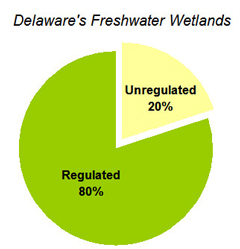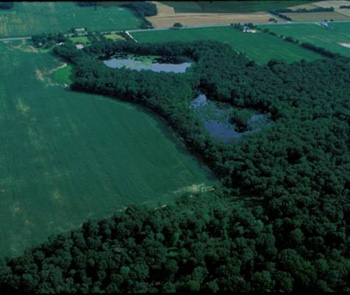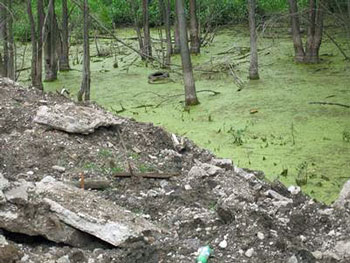Even with numerous federal and state level protection efforts, many nontidal (e.g., headwater tributaries) and isolated (e.g., flooded forests, seasonal ponds) wetlands are threatened because of gaps in existing regulations or are being impacted illegally due to limited enforcement activity.

Legally, wetlands are permitted to be impacted on a small scale with blanket approvals that carry no reporting or mitigation requirements. The sum of the small-scale impacts can be detrimental to ecosystems as a whole.
In addition, some previously-converted wetlands do not fall under regulatory control or lack incentive programs for protection. Recent court challenges (SWANCC and Rapanos/Carabell decisions) question the extent of waters covered by the Clean Water Act, and have created quandaries in discerning which wetlands and waterways are currently under the U.S. Army Corps of Engineers’ jurisdiction. This ambiguity has resulted in a period of vulnerability for some wetlands due to an uncertainty in enforcement responsibilities.
In Delaware, it has been estimated that approximately 30,000 acres of non-tidal/freshwater wetlands may be considered isolated — meaning these wetlands are unregulated and threatened with loss. This is about 20 percent of the non-tidal/freshwater wetlands extant throughout the state, and is in line with the estimated 20 percent nationally that are considered isolated.

Additionally, Delaware has a handful of unique wetland types which offer habitat for many rare species. Some of these wetland types are considered isolated.
Delmarva Bays, or Coastal Plain Ponds, are one of these unique wetland types. They are isolated wetland pockets that cause Delmarva Bays to be severely threatened. There are approximately 6,000 acres of these unique wetland types in Delaware.
Approximately 1,500 acres or 25 percent of Delmarva Bays/Coastal Plain Ponds fall into the isolated designation and currently have no regulations to protect them.
For the current report on Delaware wetland acreage losses and gains resulting from Delaware’s recent wetland mapping effort visit Delaware Wetlands Status and Trends.

DNREC Contact Information
To file an official confidential complaint, call DNREC’s Wetlands and Waterways Section at 302 739-9943 or DNREC’s complaint hotline (especially at night or on weekends) at 1-800-662-8802.
Contact a U.S. Army Corps of Engineers Enforcement Representative
U.S. Army Corps of Engineers Regulatory Branch Philadelphia District
100 Penn Square East Wanamaker Building
Philadelphia, PA 19107
Regulator of the Day phone: 215-656-6728
U.S. Army Corps of Engineers Dover Field Office
1203 College Park Drive Suite 103
Dover, DE 19904
302-736-9763
Related Topics: regulations, watershed, wetlands